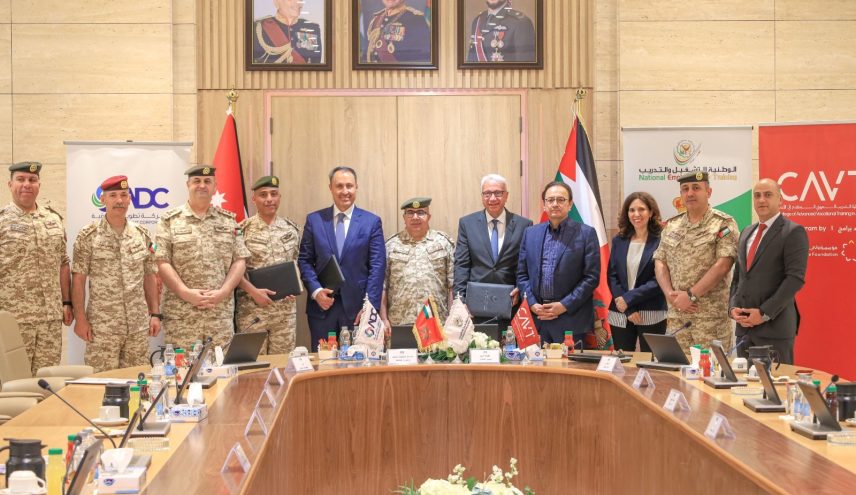Signing of a Memorandum of Understanding Between the National Employment and Training Company, the Advanced Vocational Training College in Jordan, and Aqaba Development Corporation

As part of national efforts to strengthen vocational education and training in Jordan, the National Employment and Training Company, Aqaba Development Corporation, and the Advanced Vocational Training College in Jordan—one of the Crown Prince Foundation’s programs—signed today, Monday, a Memorandum of Understanding for the operation and sustainability of the Aqaba National Vocational Training Hub. The aim is to enhance the capacities of Jordanian youth and support the local labor market. The signing was attended by Brigadier General Eng. Ammar Al-Sarairah, Assistant for Planning, Organization, and Defense Resources; Dr. Tamam Mango, CEO of the Crown Prince Foundation; and Eng. Omar Al-Ma’ani, Chairman of the Board of Trustees of the Advanced Vocational Training College in Jordan.
The MoU was signed by Brigadier General Ashraf Alimat, Director General of the National Employment and Training Company; Hussein Safadi, CEO of Aqaba Development Corporation; and Eng. Ammar Ghraybeh, CEO of the Advanced Vocational Training College in Jordan.
The memorandum stipulates the development of modern and sustainable mechanisms for operating the Aqaba Training Hub, ensuring that training programs align with the labor market needs of the Aqaba Special Economic Zone, and enhancing the quality and efficiency of training offered at the Hub. It also aims to provide recognized certificates for male and female trainees, in addition to establishing a steering committee to oversee the Hub’s strategic vision and ensure compliance with the highest quality standards.
Brig. Gen. Al-Sarairah highlighted the importance of developing the vocational and technical training system as one of the strategic pillars for building the capacities of Jordanian youth and strengthening their readiness for the labor market. He noted that the project reflects the national direction of achieving integration between state institutions to maximize developmental impact in promising economic zones such as Aqaba.
Brig. Gen. Alimat stated: “This step reflects the continuous commitment of the National Employment and Training Company to strengthening the vocational training system in the Kingdom and providing an advanced training environment that enables youth to acquire the skills required by the labor market. This is a key factor in the success of this initiative and in achieving a real, sustainable impact at the levels of training and employment.”
In the same context, Safadi commented: “This initiative is an important step toward building a comprehensive vocational and technical training system that responds to the challenges of our time and the demands of the labor market. It opens new horizons for youth to access real employment opportunities, with a tangible impact on qualification, employment, and empowerment.”
Eng. Ghraybeh affirmed: “The Advanced Vocational Training College in Jordan contributes to training youth in a way that ensures the availability of a highly skilled workforce capable of adapting and meeting the ever-changing demands of the labor market. Our goal is to make vocational and technical training in Jordan broader and more inclusive, in order to create jobs and promote national economic development.”
This initiative represents a translation of the Royal vision aimed at empowering Jordanian youth, strengthening their technical and vocational skills, and supporting the Jordanian Armed Forces – Arab Army in implementing vocational and technical training projects in cooperation with public and private institutions, in alignment with the evolving needs of the labor market.
News Archive
National Employment and Training Company Signs Memorandum of Understanding with Mafraq Development Company
Memorandum of Understanding Between the Ministry of Youth and the National Employment and Training Company (NET)
The Role of the Jordan Armed Forces in Achieving Comprehensive National Development
His Royal Highness Crown Prince Al Hussein bin Abdullah II Inaugurates the Aqaba National Vocational Training Hub, Affiliated with the National Employment and Training Company, and Emphasizes Its Role in Training and Qualifying Youth in Aqaba and the Southern Governorates to Equip Them with Labor Market Skills